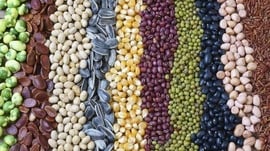(VAN) According to the Mercantile Exchange of Vietnam (MXV), the agro-products and industrial raw materials market ended in the red on July 10th.
Notably, the prices of both Robusta and Arabica coffeeplummeted by 3.4% and 2.5% respectively compared to yesterday. The surge in export activities from major producing countries exerted pressure on the market. The commodity price index for all three groups (excluding energy) declined, pulling the MXV index down by 0.44% to 2,259 points.
After four consecutive bullish sessions, Robusta coffee prices reversed sharply.
After rising for four consecutive sessions and surpassing the historical peak set in April, Robusta coffee prices reversed course and dropped nearly 3.4% in yesterday’s trading session. Similarly, Arabica coffee prices fluctuated heavily but closed the session down by 2.56% compared to the reference point.
Alongside technical pressures, the surge in export activities from major producing countries has created downward pressure on the market.
According to data from the Brazilian government, in June 2024, the country exported 203,278 tons of coffee beans, a 47% increase compared to the same period last year. Additionally, Colombia’s coffee production in the first six months of the year increased by 16% to 5.82 million bags, while exports rose by 15% to 5.74 million bags compared to the same period last year.
Furthermore, positive progress in coffee harvesting in Brazil indicates the potential for additional new crop supplies to the market. According to Safras & Mercado, as of July 5, Brazilian farmers had completed 58% of the harvest, higher than the 52% from the same period last year and the five-year average of 54% for this time, thanks to dry weather conditions.
Elsewhere on the industrial materials price board, cocoa prices also reversed course, falling by 0.79%, as the market grew concerned about declining consumption in the second quarter in Europe and Asia due to record-high prices. The market anticipates that European cocoa grinding will decrease by 2% compared to the same period last year, reaching the lowest level in four years. Additionally, cocoa grinding output in Asia and North America is also expected to decline in the report due next week.
Many agricultural commodities faced selling pressure right at the start of trading.
Closing out the previous trading session, the agricultural market witnessed a simultaneous decline in all commodities. Notably, CBOT soybean prices fell by over 1%, marking the third consecutive session of weakening. The market continued to be under pressure, closing at its lowest level in nearly four years. Brazil’s higher-than-expected exports this month have driven selling pressure in the market.
In a newly released report, the Brazilian Grain Exporters Association (ANEC) forecasts that Brazil will export 10.29 million tons of soybeans in July, up from the previously projected 9.5 million tons. This figure is lower than the 14.5 million tons recorded in June but exceeds the 9.9 million tons from the same period last year. Brazil’s ramped-up exports are expected to keep the market well-supplied, which has been a factor in the weakening soybean prices.
Wheat prices faced selling pressure right from the open, falling nearly 2% yesterday. Improved weather conditions in Russia have contributed to market pressure.
Recently, LSEG’s commodity research centre raised its forecast for Russia’s 2024-2025 wheat production to 82.9 million tons, a slight increase from previous estimates. This adjustment is due to the return of rains in the Ural and Siberia regions, which have improved soil moisture. This is expected to increase spring wheat yields to 1.97 tons/ha, contributing to better supply conditions. Weather forecasts indicate above-normal rainfall in Siberia for the remainder of the week, with wet conditions in the spring wheat-growing regions. These factors have weighed heavily on the market.
In the domestic market, soybean meal import prices showed a slight downward trend as of yesterday. At Cai Lan port, the offer price for South American soybean meal for November and December delivery hovered around VND 11,450/kg. Meanwhile, at Vung Tau port, the offer price was slightly lower, around VND 11,300/kg.
Agriculture News | Agri Products Price



